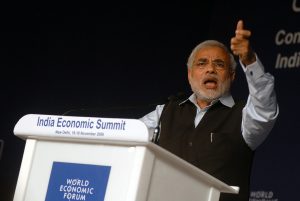Memo #297
How Modi won may tell us something about the face of a Modi premiership.
By John Harriss – jharriss [at] sfu.ca
Read Part 1 of this memo HERE.
 Yes, Modi did it—won a transformative electoral victory. But HOW he did it is also important. There are three aspects of these elections that stand out: big business clearly supported Modi as it has never so clearly supported one candidate or party; significantly thanks to this support, Modi and the BJP were disposed of enormous resources and widespread media support; and third, Rashtriya Swayamsevak Sangh (RSS), the extraordinary organisation of ‘national volunteers’ that is the heart of the Hindu nationalist movement, worked more vigorously for Modi than it has done for the BJP in previous elections.
Yes, Modi did it—won a transformative electoral victory. But HOW he did it is also important. There are three aspects of these elections that stand out: big business clearly supported Modi as it has never so clearly supported one candidate or party; significantly thanks to this support, Modi and the BJP were disposed of enormous resources and widespread media support; and third, Rashtriya Swayamsevak Sangh (RSS), the extraordinary organisation of ‘national volunteers’ that is the heart of the Hindu nationalist movement, worked more vigorously for Modi than it has done for the BJP in previous elections.
These campaign features may be significant indicators of the pattern and priorities of Modi’s premiership. There can be no doubt of his support for big business, or that the political clout of the corporate sector that has grown significantly over the last quarter century will be extended. Perhaps his government will succeed as no previous administration has done in reforming India’s labour laws, which are held by liberal economists to be such a major constraint for Indian business. Whether he will restrict foreign direct investment in the retail sector, in line with campaign promises and with the wishes of an important section of the BJP’s historic support base amongst the petite bourgeoisie, is going to be one significant marker.
It seems possible, even likely, that the Modi-led government will aim to overturn critical legislation passed by the last government, so as to make the acquisition of land much easier for business, and to replace Congress welfare programs (including the massive rural employment guarantee program) with cash transfers. But we can be sure he will be careful to maintain and build support amongst the masses of rural poor. Perhaps the critical question is whether he will do this by playing the Hindu nationalist card—as the BJP seems to have done with some success in parts Uttar Pradesh over the past year.
Will Modi pursue the long-standing Hindu nationalist agenda of ensuring the construction of a temple for Lord Ram on the site of the old mosque, the Babri Masjid in Ayodhya; of reforming the civil code; and of changing the constitutional status of the state of Jammu and Kashmir? If he does, how will these moves affect communal relations in India or relations with Pakistan? Only time will tell whether Modi’s idea of India is the generous and inclusive one that he promised at times during his campaign, or the one that was suggested by his campaign’s use of Hindu symbols and appeals to Hindu sacred geography.
It may well be, however, that given the wide base of support he has won Modi will surprise us all, disappointing the expectations of some but defying his critics by governing with greater wisdom than they believe him capable.
About the Author:
John Harriss is Professor and former Director of the School for International Studies at Simon Fraser University where he specializes in Indian politics, civil society, and political economy.

How Narendra Modi pulled off his historical victory hints at the priorities that will define his imminent premiership (credit: World Economic Forum).
Links:
- Stuart Corbridge, John Harriss and Craig Jeffrey, India Today: Economy, Politics and Society, Cambridge: Polity Press, 2013
- Jean Drèze, “The Gujarat Muddle,” The Hindu, April 2014
- Atul Kohli, Poverty Amid Plenty in the New India, New York: Cambridge University Press, 2012
- Arvind Panagariya, India: The Emerging Giant, New York: Oxford University Press, 2008
Related Memos:
See our other memos on India.
[…] Asia Pacific Memo Featuring Accessible Scholarly Knowledge about Contemporary Asia Skip to content HomeBecome a ContributorAbout/ContactPublic Outreach GrantInstitute of Asian ResearchAdvertisingContributorsWhere our contributors are located (interactive maps)Grouped MemosVideo InterviewsPacific Affairs (Scholarly Journal)ThemesEvent Focused100 Years after the Xinhai RevolutionAsia at the 2011 Cannes G202011 Japan Earthquake and TsunamiCelebrating 150 Years of TagoreThailand 2011 Election and 2010 ConflictTopic FocusedDigital mobilization and censorship in the Asia PacificLabour Migration from Southeast AsiaLabour Migration to Northeast AsiaPolitical Development of MongoliaWater, Scarcity, and Tibetan Plateau FrontiersEzra Vogel’s Deng Xiaoping and the Transformation of ChinaOrigins of Social Protests in ChinaChinese LiteraturePacific ProspectiveSubscribe ← Nǐ sǐ wǒ huó (“You Die, I live”): Xi Jinping’s Anti-Corruption Campaign as Power Consolidation Modi: Breaking the Mold of Indian Politics (part 2 of 2) → […]
[…] Asia Pacific Memo Featuring Accessible Scholarly Knowledge about Contemporary Asia Skip to content HomeBecome a ContributorAbout/ContactPublic Outreach GrantInstitute of Asian ResearchAdvertisingContributorsWhere our contributors are located (interactive maps)Grouped MemosVideo InterviewsPacific Affairs (Scholarly Journal)ThemesEvent Focused100 Years after the Xinhai RevolutionAsia at the 2011 Cannes G202011 Japan Earthquake and TsunamiCelebrating 150 Years of TagoreThailand 2011 Election and 2010 ConflictTopic FocusedDigital mobilization and censorship in the Asia PacificLabour Migration from Southeast AsiaLabour Migration to Northeast AsiaPolitical Development of MongoliaWater, Scarcity, and Tibetan Plateau FrontiersEzra Vogel’s Deng Xiaoping and the Transformation of ChinaOrigins of Social Protests in ChinaChinese LiteraturePacific ProspectiveSubscribe ← Modi: Breaking the Mold of Indian Politics (part 2 of 2) […]